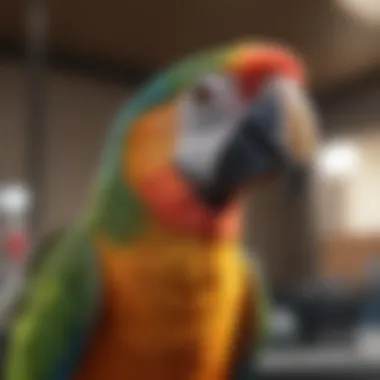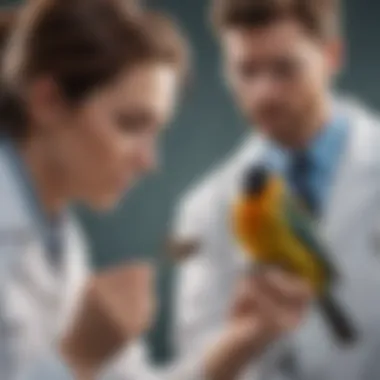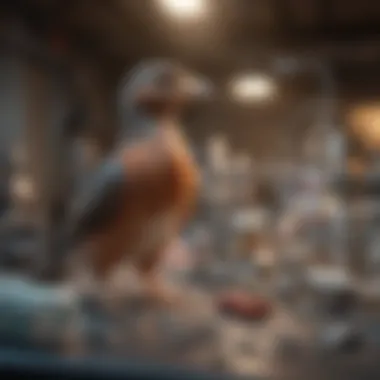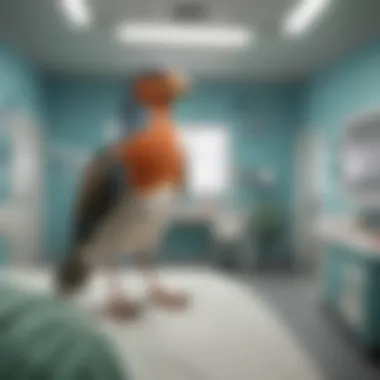The Essential Role of Specialized Bird Hospitals in Avian Health


Intro
Understanding the needs and behaviors of pet birds is the first step towards ensuring their health and wellness. As pets, birds offer unique companionships, but they come with specific requirements that differ from other animals. This necessitates the existence of specialized hospitals equipped to address their avian-specific health concerns. In this article, we will explore the necessity of these specialized facilities in great detail.
Understanding Your Pet
Pet Behavior Basics
Birds have complex behavioral patterns. Each species displays distinct habits influenced by their natural instincts. For instance, parrots are known for their need for social interaction and mental stimulation. Understanding these behaviors can help foster a nurturing environment for your bird.
Common Breed Characteristics
Different bird breeds exhibit unique characteristics that can impact their care. Cockatiels, for example, are friendly and often imitative, while budgerigars are known for their vocalizations. Recognizing these traits can guide owners in choosing the appropriate care methods and environments that suit their birds.
Species-Specific Needs
Different species have different needs. For instance, larger birds like macaws require extensive space and a varied diet rich in fruits, vegetables, and nuts. On the other hand, smaller birds may thrive on seeds and pellets tailored to their size. Specialized hospitals understand these needs and can provide tailored care that general veterinarians might overlook.
Pet Care and Maintenance
Feeding Guidelines
Proper nutrition is crucial for avian health. A balanced diet helps in preventing diseases and ensuring long life. Research indicates that fresh fruits, vegetables, and high-quality pellets should form the core of a bird’s diet. Consulting with an avian vet about the best diet for your specific species is highly advisable.
Grooming Essentials
Regular grooming helps maintain a bird's feathers and beak. Nail trimming and feather clipping, when necessary, are often performed at specialized hospitals. Birds that go un-groomed may face health issues, including inability to fly or stress, making regular visits to these facilities essential.
Hygiene Practices
Hygiene is vital for birds. Keeping cages clean and monitoring for droppings that indicate illness is essential. Specialized hospitals provide seminars and information on proper hygiene practices that help owners maintain a healthy environment for their birds.
Health and Wellness
Routine Vet Check-ups
Routine veterinary check-ups can identify health issues early. Just like cats and dogs, birds also need regular health assessments to check for conditions that might not show initial symptoms. Specialized hospitals offer tailored wellness programs for various bird species.
Vaccination Needs
Certain birds also require vaccinations. For example, birds can be susceptible to diseases like psittacosis. Vaccination is an integral part of preventive care, and specialized avian hospitals are essential for this service.
Recognizing Signs of Illness
Birds can be stoic when it comes to pain. Thus, recognizing early signs of illness is crucial. Changes in behavior, such as lethargy or altered appetite, should prompt an immediate visit to an avian specialist.
Specialized hospitals are vital for addressing the unique health challenges that birds face.
Enrichment and Activities
Indoor vs.
Outdoor Activities
Providing opportunities for exercise is important. Indoor spaces can limit movement, so it's crucial to offer toys and play areas. Outdoor enrichment under supervision is also beneficial, provided safety measures are in place.
Interactive Toys and Games
Interactive toys can stimulate a bird's mind. These toys help prevent boredom and associated behavioral issues. Owners should consult with specialists on the best types of toys suitable for their species.
Socialization Opportunities


Social interaction is a fundamental need for most birds. Speaking, handling, and even allowing them to interact with other birds can improve their disposition and mental health. Specialized hospitals can provide guidance on enhancing socialization for your avian companion.
Preface to Avian Health
Avian health is an essential aspect of caring for pet birds and understanding their unique requirements. Birds are distinct from other pets, such as cats and dogs, due to their specific physiological and behavioral traits. This section sets the groundwork for discussing the necessity of specialized hospitals for avian species.
Understanding Bird Physiology
Birds possess specialized anatomical structures and functions that require an in-depth understanding for effective care. Their respiratory systems, for example, are remarkably different from those of mammals. Birds have a unique air sac system that allows for more efficient oxygen exchange. This physiological characteristic means they can easily become stressed if not properly managed. Additionally, birds have lightweight bones containing air pockets, which enable flight but may complicate medical procedures. Their skin also varies significantly; many species have feathers that can hide skin issues, making regular health check-ups vital. Understanding these elements is crucial for both bird owners and veterinarians alike.
Common Health Issues in Birds
Birds can suffer from a variety of health issues, some of which are unique to avian species. Common conditions include:
- Feather plucking: This behavioral issue can stem from stress, boredom, or illness.
- Respiratory issues: Birds are susceptible to respiratory diseases due to their sensitive lungs.
- Obesity: Many pet birds can become overweight, leading to severe health problems.
- Gastrointestinal diseases: Dietary choices often lead to digestive disorders in birds.
Recognizing the signs of these health issues is pivotal for early intervention. Bird owners should remain vigilant and seek specialized veterinary advice when observing unusual behavior or symptoms. Understanding avian health issues proves critical and further emphasizes the need for specialized hospitals dedicated to birds.
The Need for Bird Hospitals
Specialized hospitals for birds are critical in providing adequate health care tailored for these unique pets. The necessity of dedicated avian hospitals lies in their ability to address specific needs of birds that general veterinary practices may overlook. These hospitals serve as a refuge where a broader spectrum of avian health issues can be understood and treated effectively. By having specialized facilities, bird owners can ensure their pets receive the best possible care.
Limitations of General Veterinary Practices
General veterinary clinics often lack the specialized knowledge essential for diagnosing and treating avian diseases. Birds have unique physiology; their organs, metabolic rates, and reactions to medications can differ drastically from other animals. This often leads to misdiagnosed or untreated conditions.
The limitations of general practices include:
- Lack of Equipment: Many standard veterinary clinics do not have the necessary equipment to perform specialized tests or surgeries that birds might need.
- Training Deficits: Veterinarians in general practices may not have extensive training in avian medicine. This can result in a gap in knowledge about specific diseases and treatment protocols.
- Limited Experience: Birds are not common patients in many practices, leading to clinicians having less hands-on experience with them compared to other animals.
These factors underscore the importance of specialized bird hospitals, equipped with the right tools and trained professionals to treat avian patients effectively.
Unique Care Requirements for Birds
Birds necessitate a distinct approach to their health care due to their specialized needs. Treatments and diagnostics for them often vary significantly compared to dogs or cats.
Some unique care requirements include:
- Nutritional Needs: Avian diets are specialized. Birds require specific nutrients that differ from those needed by other pets. Understanding these requirements is essential in preventing diseases related to nutrition.
- Behavioral Considerations: Birds exhibit unique behaviors that can signify stress or illness. Knowing what is normal for a particular species allows veterinarians to detect abnormalities early.
- Environmental Factors: The living environment massively affects avian health. Elements like lighting, humidity, and social interaction should be monitored and managed appropriately.
Specialized hospitals employ seasoned avian veterinarians who understand these characteristics, leading to precise treatment plans catered to individual birds. This tailored approach is crucial for ensuring the long-term welfare and health of birds.
Types of Services Offered
The significance of specialized hospitals for birds cannot be overstated. These facilities provide various essential services tailored to the needs of avian species. Each service contributes to the overall well-being of birds, ensuring they receive the appropriate care and attention required for their unique physiology.
Preventive Care and Health Checkups
Preventive care is an essential aspect of avian health management. Regular health checkups help identify potential problems before they become serious issues. Specialized bird hospitals offer wellness exams designed specifically for birds. These exams typically include physical examinations, weight checks, and assessments of diet and behavior. Blood tests and fecal examinations can also be performed to detect infections or nutritional deficiencies.
Preventive care not only aids in early detection but also helps educate bird owners about proper husbandry. Knowledge about a bird's dietary needs, environmental enrichment, and behavioral health ensures a higher quality of life. As the saying goes, "an ounce of prevention is worth a pound of cure," especially in avian care.
Benefits of Preventive Care:
- Early Detection: Identifying problems before they escalate.
- Education for Owners: Teaching bird owners about health maintenance.
- Long-term Health: Promoting a longer, healthier life for the bird.
Emergency Services for Avian Patients
Emergencies can arise at any time, often requiring immediate intervention. Specialized bird hospitals are equipped with the necessary tools and expertise to address urgent care needs. Common emergencies include trauma from accidents or fights with other pets, sudden onset of illness, or poisoning from toxic plants or substances.
Having access to avian emergency services means quicker response times, which can be crucial in saving a bird’s life. These facilities often have experienced staff available 24/7 and can provide necessary stabilizing treatments before further care is given.
Key Elements of Emergency Services:


- Immediate Care: Addressing urgent medical issues promptly.
- Expert Staff: Professionals trained specifically in avian emergencies.
- Advanced Equipment: Access to necessary tools for swift interventions.
Surgical Procedures for Birds
Surgical interventions may be required for various reasons, including tumors, physical injuries, or reproductive health issues. Specialized bird hospitals have veterinarians trained in avian surgery, which requires different techniques compared to traditional veterinary practices.
The surgical facilities should offer appropriate anesthesia protocols and postoperative care tailored to birds. Because they are prey animals, birds have unique responses to stress and sedation, necessitating specialized knowledge and preparation.
Considerations for Surgical Procedures:
- Specialized Training: Surgeons must understand bird anatomy and physiology.
- Postoperative Monitoring: Care needed to ensure recovery is closely observed.
- Minimizing Stress: Techniques to reduce anxiety and fear for better outcomes.
Specialized Diagnostic Testing
Accurate diagnosis is essential for effective treatment. Specialized hospitals offer a range of diagnostic testing that goes beyond what is typically available at general veterinary clinics. These tests can include radiology, ultrasound, and advanced blood work specific to avian species.
Access to these diagnostic tools is crucial for identifying underlying health problems. Accurate testing leads to better-targeted treatment plans and improves the overall success of medical interventions.
Benefits of Specialized Diagnostic Testing:
- Accuracy: Improved diagnostic precision for avian species.
- Variety of Tests: Access to a wide range of testing options.
- Tailored Treatment Plans: More effective treatments based on accurate diagnoses.
In summary, the services offered by specialized bird hospitals play a critical role in avian healthcare. Through preventive care, emergency services, surgical procedures, and specialized diagnostic testing, these facilities ensure that birds receive the exposure to adequate healthcare needed for a healthy and balanced life.
Training and Qualifications of Avian Veterinarians
The care of birds requires specialized knowledge and skills. Avian veterinarians must navigate a specific field that combines general veterinary education with a deeper understanding of avian physiology and behavior. The importance of this training cannot be overstated. As birds have unique anatomical structures and health requirements, a dedicated training pathway is vital.
Educational Pathways
To become an avian veterinarian, individuals typically begin with a Doctor of Veterinary Medicine (DVM) degree from an accredited veterinary school. This foundational education provides knowledge about various animal species. However, avian veterinarians must pursue additional training. After earning a DVM, many seek internships focused on bird care.
Completing a residency in avian medicine is crucial. These programs often include clinical rotations, research opportunities, and exposure to various avian species. The training covers topics like avian anatomy, specific disease processes, and surgical techniques. The benefits of extensive training include:
- Enhanced diagnostic skills for avian-specific conditions.
- Mastery of surgical procedures relevant to birds.
- Understanding of unique behavioral traits.
- Ability to communicate effectively with bird owners about specific care needs.
A well-trained veterinarian can recognize subtle signs of illness that might be overlooked. Understanding bird behavior is necessary, as many birds hide their ailments until they become severe. An educated eye can catch these issues early, improving outcomes.
Board Certification in Avian Medicine
Achieving board certification is a significant accomplishment for any veterinarian. For avian specialists, this involves passing rigorous examinations administered by the American Board of Veterinary Practitioners. Board certification in avian medicine demonstrates a high level of expertise and commitment to the field.
Certified avian veterinarians show further dedication to advancing their knowledge. They often engage in continuing education, staying current on research and advancements in avian health. This ongoing learning ensures they can provide the best care possible to their patients.
"The specialization in avian medicine illustrates the growth in understanding and treating birds as companion animals with unique needs."
Having board-certified avian veterinarians is crucial for specialized hospitals. This ensures that bird owners receive care tailored specifically to their pet's needs. Additionally, the presence of qualified staff enhances the hospital's reputation and helps in community outreach, increasing awareness about avian health.
In concluding this section, the training and qualifications of avian veterinarians play a pivotal role in maintaining the health of birds. Specialized knowledge equips these professionals to handle the unique challenges that arise in avian medicine, ultimately leading to better care and outcomes for bird patients.
Challenges Faced by Bird Hospitals
The establishment and operation of specialized bird hospitals is not without its complications. Recognizing and addressing these challenges is crucial for the sustainability and effectiveness of avian health care. The complexities of funding, awareness, staffing, and retention significantly impact how these facilities provide essential services to our avian companions. Understanding these aspects enables stakeholders to find solutions that can enhance the overall health and well-being of birds.
Funding and Resource Limitations
One of the main obstacles for avian hospitals is securing adequate funding. Most specialized bird hospitals do not operate on the same financial scale as larger animal clinics. This limitation can affect various aspects, including equipment purchases and staff salaries. Bird hospitals often rely on donations, grants, and sometimes the fees charged to bird owners for services. Unfortunately, many owners may not fully understand the costs associated with specialized avian care, leading to an underestimation of required financial support.
Bird hospitals usually struggle to finance advanced diagnostic tools. Specialized equipment such as endoscopes, digital radiography, and laboratory facilities for blood work can be very expensive. Without access to such essential tools, diagnosing or treating birds effectively becomes difficult.
Public Awareness and Outreach Efforts
Awareness about the importance of specialized bird care is another significant challenge. Many pet owners may not realize that general veterinary practices might lack the expertise to address specific avian health needs. Effective outreach programs are necessary to educate the public. This education can empower bird owners to understand when specialized care is essential.


Bird hospitals must work towards building community awareness. This includes using social media platforms and partnerships with organizations focused on avian welfare to engage potential clients. An increase in awareness can lead to better health outcomes for birds and more patients for these facilities, ultimately contributing to their financial stability.
Staffing and Retention Issues
Staffing presents a relevant challenge for specialized avian hospitals. Recruiting qualified veterinarians who are trained in avian medicine is often difficult. The limited number of residency programs in avian medicine contributes to this shortage. Additionally, even when staff is hired, retention can be a problem due to the high demands of the profession and often lower financial compensation compared to other areas of veterinary medicine.
Creating a supportive and conducive work environment is essential for retention. Employers must provide continued education opportunities and competitive benefits. Striking a balance between patient care and employee satisfaction is crucial for maintaining a dedicated team.
Case Studies of Unique Bird Hospital Experiences
The exploration of case studies in bird hospitals offers valuable insights into the specific challenges and successes of avian medicine. In this section, we will focus on two distinct areas—successful treatment outcomes and lessons learned from difficult cases. These experiences are not only important for the institutions involved but also for pet owners seeking to understand the complexities of avian health care.
Successful Treatment Outcomes
Successful treatment stories illuminate the effectiveness of specialized bird hospitals. They serve as a testament to the skill and dedication of avian veterinarians. Such outcomes can enhance the faith pet owners have in specialized care. When birds receive the right treatments, they recover from ailments that may not respond well in standard veterinary practices.
- Case of a Macaw with Feather Plucking: A macaw presented with severe feather plucking, a common behavioral issue. After a thorough assessment, the team determined that the bird's environment needed modification and introduced behavioral therapy. Within weeks, the noted progress was encouraging, and the bird displayed reduced stress.
- Rescue of an Injured Parakeet: An injured parakeet was brought in with a fractured wing. The surgical team performed a delicate operation to repair the bone. Post-surgery, the bird was given tailored rehabilitation sessions. Ultimately, the parakeet regained full flight capability and was successfully re-released into the wild.
These cases underscore the effectiveness of specialized knowledge and targeted treatment plans. They emphasize the significant role specialized hospitals play in achieving positive health outcomes for birds.
Lessons Learned from Difficult Cases
While many cases conclude successfully, not all treatment scenarios can achieve ideal outcomes. Difficult cases in bird hospitals can yield profound lessons for future practices and protocols. Addressing these issues is crucial for improving avian care standards.
- Chronic Respiratory Issues in a Cockatoo: A cockatoo presented with chronic respiratory problems. Despite numerous interventions, the condition persisted. The experience highlighted essential factors like environmental allergens and the importance of comprehensive diagnostic testing. It showed that understanding the bird's surroundings is equally vital as the clinical treatment.
- Confounding Symptoms in an African Grey: An African grey came in with vague but alarming symptoms. Various tests were conducted, yet a definitive diagnosis remained elusive for weeks. This case taught the importance of interdisciplinary collaboration, as a consultation with an avian behaviorist revealed underlying stressors. The key takeaway was that working across disciplines can yield insights that direct medical solutions may miss.
“Each case reflects unique challenges, but they also pave the way for innovation and improved care protocols.”
Engaging with challenging cases fosters growth in the field of avian medicine. Bird hospitals must continually refine their practices. These experiences allow for critical evaluation of methods and inspire ongoing educational efforts to enhance care quality. Understanding both successful outcomes and challenges equips pet owners with a broader view of avian health care, encouraging informed decisions for their feathered companions.
The Future of Avian Medical Care
The future of avian medical care is essential to understanding how the health of pet birds can improve over time. As more people recognize birds as beloved companions, their medical needs must be prioritized. Specialized hospitals are vital in addressing the unique health requirements of birds. They ensure that advancements in treatments and preventative measures are consistently applied, keeping pet birds happier and healthier.
Innovations in Avian Medicine
Innovations in avian medicine are crucial for the ongoing evolution of bird care. These innovations include the development of new treatments tailored specifically for birds. For instance, advances in minimally invasive surgical techniques can lead to faster recovery times. Such methods may reduce the trauma birds experience during procedures, which can be significant due to their delicate physiology.
Additionally, technology such as telemedicine is becoming more popular in avian care. Bird owners can consult with veterinarians through video calls. This approach makes specialized advice more accessible, especially for those in remote or underserved areas. Furthermore, the use of advanced imaging techniques, like MRI and CT scans, allows veterinarians to diagnose issues that were hard to detect in the past.
Veterinary pharmaceuticals designed specifically for avians are also gaining momentum. These medicines help treat illnesses more effectively than general medications used for other species. They often come with dosages and formulations that cater directly to the unique physiological features of birds.
Advancements in Research and Development
Research and development in avian health continue to play an important role in shaping the future of pet bird care. Studies on bird behavior, nutrition, and disease prevention contribute significantly to better health outcomes. Ongoing research helps to create dietary guidelines that meet the specific nutritional needs of various bird species.
Moreover, investigations into the genetics of different bird species lead to a better understanding of hereditary diseases. For example, knowing which species are prone to certain conditions allows veterinarians to implement proactive measures. Collaboration between veterinary schools and research institutions can yield innovative techniques that can be used to improve avian care practices.
The role of specialized hospitals extends beyond treatment; they act as centers for education and outreach, helping to inform the public about best practices for bird care. Thus, investing in the future of avian medical care not only means developing superior treatment options but also ensuring that bird owners are well-informed.
Specialization in bird medicine is not just about treating the sick. It’s about fostering a comprehensive understanding of avian health to improve the quality of life for pet birds everywhere.
The End
The Importance of Specialized Avian Care
In summary, the necessity for specialized hospitals dedicated to avian health cannot be overstated. Birds have unique physiological features and common health problems that differentiate them from other pets. General veterinarians may lack the specific knowledge and experience needed to effectively address these challenges.
Specialized avian care provides comprehensive treatment tailored specifically to the needs of birds. Facilities designed to cater to avian patients offer an environment that reduces stress, which is crucial for their recovery. These hospitals are equipped with advanced medical technology and staff trained specifically in avian medicine, ensuring that birds receive the best possible care. Through preventive measures, timely diagnoses, and appropriate treatments, specialized avian hospitals contribute significantly to the health and well-being of pet birds.
“The role of specialized hospitals in avian health is a pillar supporting not just individual bird owners, but the broader responsibility for bird welfare.”
Call to Action for Bird Owners
Bird owners hold a vital role in ensuring the health of their pets. The journey towards better avian care starts with awareness and proactivity. Here are some practical steps that can be taken:
- Research Specialized Facilities: Seek out avian hospitals with reputable veterinarians who specialize in bird care. Knowing where to go in emergencies is key.
- Schedule Regular Check-ups: Just like other pets, birds benefit from routine check-ups. Early detection of health issues can prevent major problems in the future.
- Educate Yourself About Your Bird's Needs: Understanding the specific health issues that may arise for your bird species can enable timely action and effective communication with veterinarians.
- Advocate for Avian Health: Promote awareness within your community about the importance of specialized avian care. Sharing knowledge can help other bird owners make informed decisions.
Engagement and investment in avian health can lead to a better quality of life for pet birds. By working together with specialists, owners can foster a healthy environment that extends beyond medical treatment, encompassing care, nutrition, and social interactions crucial for a bird's wellbeing.







